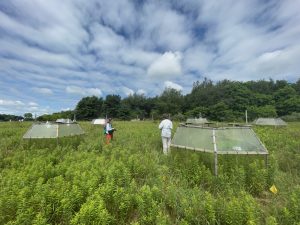The W.K. Kellogg Biological Station was home to part of a multiyear ecology project examining the combined and discrete impacts of warming and leaf herbivory on plant communities.

The KBS Long-term Ecological Research site, or KBS LTER, and the University of Michigan Biological Station both hosted plots to conduct the project, which was led by Moriah Young and Kara Dobson, from MSU’s Department of Integrative Biology and the Ecology, Evolution, and Behavior, or EEB, Program. Young and Dobson work with advisor Phoebe Zarnetske, professor of biology and EEB, in her Spatial and Community Ecology lab, as well as with KBS faculty members Sarah Evans and Nick Haddad, respectively.
Their paper appeared in the journal Ecology.
In the study, some plots were treated with insecticide to deter herbivory. Then, a series of open-top chambers — designed to raise a plot’s ambient temperature — were installed. This combination of treatments provided plots with various degrees of warming and insect herbivory.
Among the factors examined over the next several years by the authors were plant-specific traits, including seed and flower development, and community traits, such as plant biomass and species richness.
They found, in part, that as temperatures increased, plants demonstrated a tendency to grow earlier in the year than under non-warmed conditions, but only with added pressure from insect herbivory.
“We found that warming causes plants to grow earlier in the spring, but only when insects are present,” Young explained, adding that, “without accounting for this biotic interaction, we cannot fully understand how climate change will impact plants.”

A legacy of conservation; a commitment to sustainability.
3700 E. Gull Lake Drive
Hickory Corners, MI 49060
(269) 671-5117
info@kbs.msu.edu